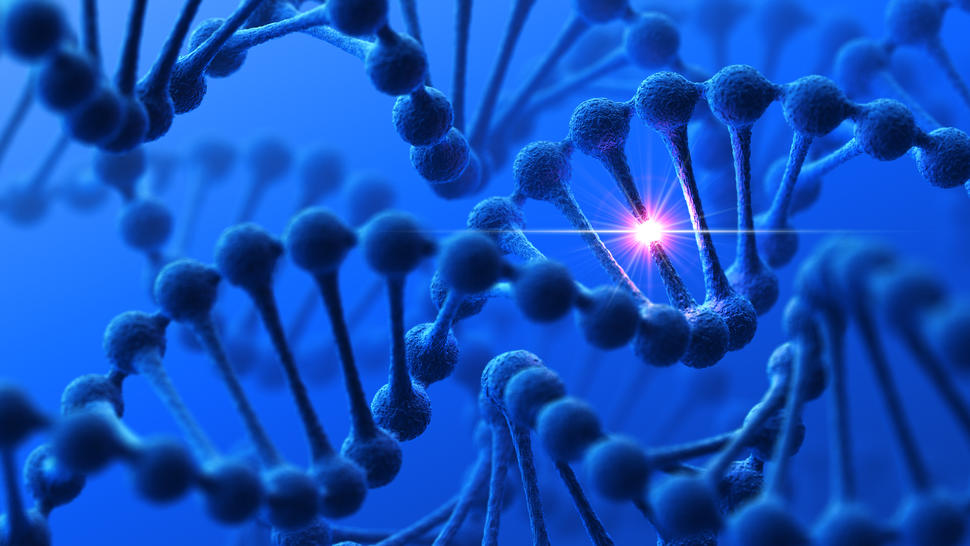Research in Early Detection of Kidney Cancer
Liquid Biopsies to Detect Small Kidney Cancers
There is no screening test that is recommended to diagnose kidney cancer early in people at average risk. Genetic counseling and blood tests—sometimes called liquid biopsy tests—to detect kidney cancers early may be offered to people with hereditary conditions that put them at high risk of such tumors. Some liquid biopsy tests might also be used for tracking response to treatment and monitoring for cancer recurrence.
Genetic Testing for Kidney Cancer Risk
About 5% of kidney cancers are caused by inherited genetic changes. Many different hereditary syndromes increase the risk of kidney cancer (and sometimes other cancers). The gene changes that cause these syndromes have been identified, and people who have a history of kidney cancer in their family can now undergo genetic testing to see if they carry any of these changes.
This information from genetic testing can help health care providers develop a personalized plan for monitoring kidney health. Genetic testing and counseling may also be recommended based on factors such as age at diagnosis and what type of kidney cancer a person has.
Research in Kidney Cancer Treatment
Until a few decades ago, kidney cancer was considered to be a single disease. But that changed after the first gene linked to kidney cancer, called the VHL gene, was discovered at NCI in the 1990s. Alterations in this gene can be inherited (in people with Von Hippel-Lindau disease), or they can arise during someone’s lifetime.
Since this discovery, researchers have come to recognize that kidney cancer is many different diseases, each driven by distinct genetic features. This work has led to the development of many therapies for kidney cancer. Ongoing research is working to further develop targeted treatments and immunotherapy in kidney cancer treatment.
Targeted Therapies for Advanced Kidney Cancer
Clear Cell Renal Cancer
The most common type of kidney cancer is clear cell renal cancer. It is also called clear cell renal cell carcinoma or clear cell RCC. VHL is the most commonly altered gene in that cancer type. The VHL protein normally blocks tumor development. However, when it is altered or missing, cancer can develop and grow. Several drugs that target the VHL gene pathway have been approved by the FDA to treat clear cell renal cancer.
Researchers are continuing to study new treatments that target the VHL pathway. For example, clinical trials are testing drugs that shut down a protein in the VHL pathway called HIF-2α.
- One study found that a drug called belzutifan (Welireg), which blocks HIF-2α, shrank clear cell renal tumors in people with Von Hippel-Lindau disease. These responses to treatment were long-lasting.
- Based on the above study, the FDA approved belzutifan for people with Von Hippel-Lindau disease who have clear cell renal cancer. It is the first drug approved to treat cancers associated with this hereditary condition.
- Results from a recent large study that compared belzutifan with another targeted drug, everolimus (Afinitor), led to the FDA approval of belzutifan for people with advanced clear cell renal cancer and no family history of the disease, who have already received two prior treatments.
- Other studies are testing belzutifan in combination with other targeted therapies and with immunotherapy.
Other types of drugs are also being tested in kidney cancer. For example, a new NCI-supported study is testing a combination of targeted drugs to help reduce the symptoms of kidney cancer that has spread to the bone.
Rare Kidney Cancer Types
About 15% of people with kidney cancer have papillary renal cell carcinoma, or papillary RCC. It is thought to start in a different kind of cell than clear cell renal cancer. Data from The Cancer Genome Atlas and other research efforts have shown that some cases of papillary RCC are driven by changes in a gene called MET. A number of studies are underway to improve treatment for people with this rare kidney cancer. Examples include:
- Researchers compared cabozantinib (Cabometyx), which targets the MET protein, with sunitinib (Sutent) in the first large randomized trial ever completed in this rare cancer type. People with advanced papillary RCC who were given cabozantinib lived about 50% longer without their disease progressing than people who received sunitinib.
- In 2020, an NCI research team found that some people with papillary RCC that had spread to other organs (metastasized) had strong responses to treatment with the drugs bevacizumab (Avastin) and erlotinib (Tarceva), which target changes specific to that subtype. In that small clinical trial, those patients lived for a median of almost 2 years without their disease progressing. Work is ongoing to better personalize treatment in this rare disease.
- An ongoing NCI-supported trial is now testing the combination of cabozantinib and the immunotherapy atezolizumab (Tecentriq) to treat metastatic papillary RCC.
Immunotherapy for Kidney Cancer
Immunotherapies are treatments that help the body’s immune system fight cancer more effectively. Immunotherapy has become a major focus of kidney cancer treatment research.
Immunotherapy After Surgery
For many people whose kidney cancer is found early, surgery alone is often enough to prevent the cancer from ever coming back. Until recently, no adjuvant therapy (treatment given after surgery) had been proven to improve how long people with kidney cancer live, even those at high risk of cancer recurrence.
But recently, a large study found that giving the immunotherapy drug pembrolizumab (Keytruda) after surgery helped people with clear-cell renal cancer at high risk of recurrence live longer. The drug can have serious side effects, however, so people with this type of cancer and their doctors must weigh the potential pros and cons of adjuvant treatment.
Immunotherapy for Advanced Kidney Cancer
Today, most people with advanced kidney cancer will receive a type of immunotherapy drug called an immune checkpoint inhibitor at some point during their treatment.
A small minority of people with clear-cell renal cancer and other, rarer types of kidney cancer have their tumors disappear entirely during treatment with these drugs. Studies are underway to uncover characteristics of patients or tumors that make immunotherapy more likely to work. And combinations of immunotherapies or of immunotherapies plus targeted therapies have been approved or are being studied in trials.
- A combination of two immune checkpoint inhibitors—ipilimumab (Yervoy) and nivolumab (Opdivo) —has been approved for the treatment of advanced kidney cancer.
- Combinations of a targeted therapy plus an immune checkpoint inhibitor have been approved for people with advanced kidney cancer, including:
- Ongoing trials are testing other combinations of immune checkpoint inhibitors and targeted therapies, in clear cell renal cancer as well as papillary RCC and other rare types of kidney cancer. Such trials include adding cabozantinib to the combination of ipilimumab and nivolumab.
Once cancer has spread from the kidney to other parts of the body, it’s not clear whether using surgery or radiation therapy to treat the initial kidney tumor helps patients live longer than treatment with immunotherapy alone. Ongoing NCI-supported trials are testing:
- adding surgery to immunotherapy for advanced kidney cancer
- adding radiation therapy to immunotherapy for advanced kidney cancer
- adding radiation therapy to other types of standard treatment for advanced kidney cancer
To date, studies have not compared existing immunotherapy combinations directly, or tested whether these drugs work better when given together than given sequentially.
Treatment of Kidney Tumors in Children
Although rare, kidney cancer can develop in children and adolescents. The most common type of kidney cancer in children is called Wilms tumor. Although screening for kidney cancer in adults hasn't been shown to be effective to date, screening ultrasounds of the kidneys may benefit children with high genetic risk for Wilms tumor.
Treatment with the combination of surgery, radiation therapy, and chemotherapy has increased 5-year survival rates for children with all stages of Wilms tumor from 40% in the 1950s to nearly 90% today. NCI-funded studies are still testing ways to use existing drugs to further improve survival.
But this intensive treatment can have serious or even fatal long-term side effects, including second cancers and scarring of the lungs. So researchers are now testing whether less-intensive treatment regimens can maintain high survival rates while reducing side effects. For example:
- An NCI-supported clinical trial, led by the NCI-funded Children’s Oncology Group (COG), found that some children with Wilms tumor that has spread to the lungs may be able to skip radiation therapy if their tumors disappear after chemotherapy alone.
- Another study led by COG enrolled children with a genetic predisposition to develop Wilms tumor who had developed cancer in one kidney. About two-thirds of these children who had chemotherapy before surgery did not need to have the entire kidney removed.
- Another COG trial found that some young children with small Wilms tumors at low risk of recurrence can safely have surgery alone, without chemotherapy. An ongoing COG study is now examining how more patients can undergo surgery alone and avoid chemotherapy.
- COG has an ongoing trial testing two chemotherapy treatments for patients with newly diagnosed or relapsed Wilms tumors. The goal is to see how well the combination chemotherapies work to stop tumor growth. The trial will help doctors understand how each treatment affects patients with different levels of risk.
The COG also conducts studies of rarer types of childhood kidney cancer. One COG study is currently analyzing data collected on the combination of targeted therapy and immunotherapy for a rare type of kidney cancer that tends to occur in adolescents and young adults called translocation renal cell carcinoma (tRCC). This study also enrolled adult patients with this rare cancer.
NCI-Supported Research Programs
Many NCI-funded researchers working at the NIH campus, as well as across the United States and throughout the world, are seeking ways to address kidney cancer more effectively. Some research is basic, exploring questions such as the biological underpinnings of cancer. And some is more clinical, seeking to translate this basic information into improving patient outcomes. The programs listed below are a small sampling of NCI’s research efforts in kidney cancer.
- NCI’s Kidney Cancer Specialized Programs of Research Excellence (SPOREs) promote collaborative, interdisciplinary research. SPORE grants involve both basic and clinical/applied scientists working together. They support the efficient movement of basic scientific findings into clinical settings, as well as studies to determine the biological basis for observations made in individuals with cancer or in populations at risk for cancer.
- NCI's National Clinical Trials Network (NCTN) is a collection of organizations and clinicians that coordinates and supports cancer clinical trials at more than 3,000 sites across the United States and Canada. NCTN currently has a variety of trials testing treatments for kidney and other genitourinary cancers.
- NCI has also formed partnerships with the pharmaceutical industry, academic institutions, and individual investigators for the early clinical evaluation of innovative cancer therapies. The Experimental Therapeutics Clinical Trials Network (ETCTN) was created to evaluate these therapies using a coordinated, collaborative approach to early-phase clinical trials. The ETCTN is currently running early-stage trials in kidney and other genitourinary cancers.
- NCI’s Division of Cancer Epidemiology and Genetics conducts studies on kidney cancer to learn about risk factors for the disease. Some of their areas of study are described in these kidney cancer research studies.
Clinical Trials
Kidney Cancer Research Results
The following are some of our latest news articles on kidney cancer research:
- Are New Immune-Based Treatments for Kidney and Pancreatic Cancer on the Horizon?
- Tumor Signatures May Help Explain Global Differences in Kidney Cancer Rates
- Pembrolizumab Provides First-Ever Overall Survival Improvement in Kidney Cancer
- Analysis Identifies 50 New Genomic Regions Associated with Kidney Cancer Risk
- Nivolumab Injections Could Make Treatment Easier for More People with Cancer
- SBRT Emerging as an Important Treatment for Early-Stage Kidney Cancer
View the full list of Kidney Cancer Research Results and Study Updates.

